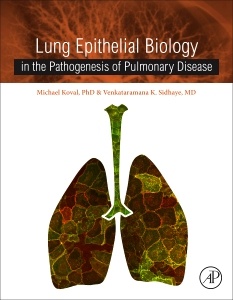Description
Lung Epithelial Biology in the Pathogenesis of Pulmonary Disease
Authors: Sidhaye Venkataramana K, Koval Michael
Language: English
Subjects for Lung Epithelial Biology in the Pathogenesis of Pulmonary...:
Keywords
AEC; Acute lung injury; Acute respiratory distress syndrome; Airway; Airway epithelial cells; Airway epithelium; Airway surface liquid; Airway therapy; Allergen; Allergic Inflammation; Alveolar; Alveolar epithelial repair; Alveolar type 2 cell; Alveolar type II epithelial cell; Alveolarization; Alveolus; Animal models; Apical; Apical junctional complex; Apoptosis; Asthma; Autophagy; Barrier dysfunction; Basal cells; Basolateral; Branching morphogenesis; Chloride channel; Chronic lung disease; Chronic obstructive pulmonary disease; Claudin; Club cells; Collagen; Connexin; Cystic fibrosis; Cystic fibrosis transmembrane conductance regulator; Cytoskeleton; Endoplasmic reticulum stress; Epithelia; Epithelial lining fluid; Epithelial sodium channel (ENaC); Epithelial-mesenchymal transition; GLUT; Glucose transporters; Influenza; Integrin; Interstitial lung disease; Ion transport; Lamellar body; Lung; Lung cancer; Lung epithelium; Lung injury; Mitophagy; Mucosal immunology; Multivesicular body; P aeruginosa; PH; Pneumocyte; Pneumonia; Progenitor; Proteostasis; Pulmonary edema; Pulmonary fibrosis; Pulmonary surfactant; Repair; Respiratory epithelium; S aureus; SGLT; SWEET; Senescence; Stem cell; Surfactant; TB; TGFβ
146.54 €
In Print (Delivery period: 14 days).
Add to cartSupport: Print on demand
Description
/li>Contents
/li>Biography
/li>Comment
/li>
Lung Epithelial Biology in the Pathogenesis of Pulmonary Disease provides a one-stop resource capturing developments in lung epithelial biology related to basic physiology, pathophysiology, and links to human disease. The book provides access to knowledge of molecular and cellular aspects of lung homeostasis and repair, including the molecular basis of lung epithelial intercellular communication and lung epithelial channels and transporters.
Also included is coverage of lung epithelial biology as it relates to fluid balance, basic ion/fluid molecular processes, and human disease. Useful to physician and clinical scientists, the contents of this book compile the important and most current findings about the role of epithelial cells in lung disease. Medical and graduate students, postdoctoral and clinical fellows, as well as clinicians interested in the mechanistic basis for lung disease will benefit from the books examination of principles of lung epithelium functions in physiological condition.
1. Junctional Interplay in Lung Epithelial Barrier Function2. Ion Transport and Lung Fluid Balance3. Glucose Transport and Homeostasis in Lung Epithelia4. Pulmonary Surfactant Trafficking and Homeostasis5. Integrin Regulation of the Lung Epithelium6. Epithelial Regeneration and Lung Stem Cells7. The Function of Epithelial Cells in Pulmonary Fibrosis8. The Role of Epithelial Cell Quality Control in Health and Disease of the Distal Lung9. The Respiratory Epithelium in COPD10. Acute Respiratory Distress Syndrome11. Epithelial Barrier Dysfunction in Asthma12. Cystic Fibrosis: An Overview of the Past, Present, and the Future
Dr. Koval's laboratory works on defining the molecular machinery that regulates formation of gap junctions (which coordinate intercellular signaling) and tight junctions (which promote tissue barrier function). The long term goal of his research is understanding how junctions are pathologically misregulated in lung injury and in diseases including alcoholic lung syndrome, acute respiratory distress syndrome and cystic fibrosis.
- Provides a single source of information on lung epithelial junctions and transporters
- Discusses of the role of the epithelium in lung homeostasis and disease
- Includes capsule summaries of main conclusions as well as highlights of future directions in the field
- Covers the mechanistic basis for lung disease for a range of audiences




